Bitcoin experienced a 20% down day this week after a bitmain blog post outlining a UASF/BIP148 contingency plan for a hard fork. The spot price has now recovered to previous levels, ending flat on the week.
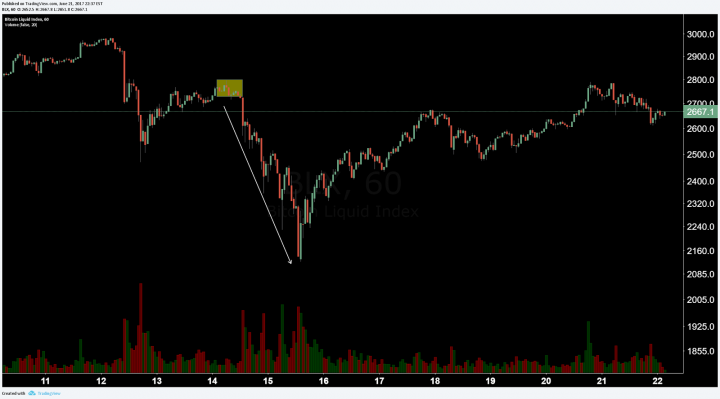
Currently, 85% of mining pools support “SegWit2x” which is taken from the New York Agreement, which states that SegWit will be adopted followed by a 2MB hard fork. This has largely been seen as a compromise between bitcoin core developers, nodes, Blockstream, miners, and others who wanted a hard fork block size increase. The implementation of SegWit is expected to be a large bullish event for price, as it will be seen as a piece of the solution towards network scalability. More on which developers and companies support which proposal can be found here.


Despite the SegWit2x proposal, support for UASF/BIP148 continues to rise among nodes. This is in large part because the hard fork will not be coded by the core developers, is not complete at the present time, and has not been tested.
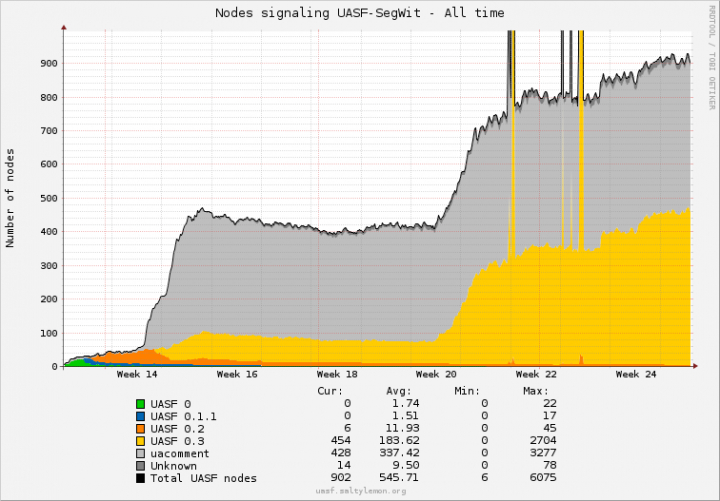
Network difficulty is now up 84.25% for the year. Difficulty increases as a function of hash rate, which also continues to break all time highs, and now sits at just over 5 trillion GH/s.
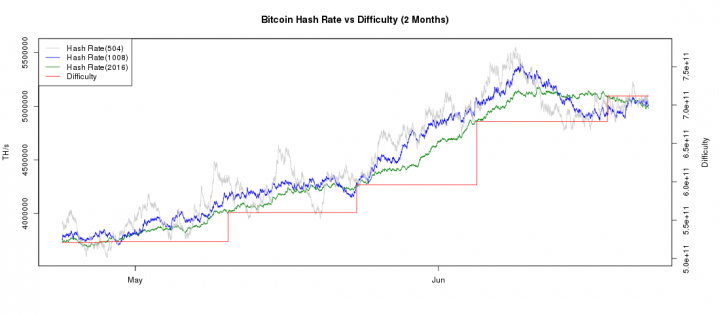
Global Over The Counter (OTC) volume on LocalBitcoins continues unabated. India recently announced legalization and further regulation of Bitcoin, which should continue to bring legitimacy for traders and businesses. As a measure of interest, OTC volume in India has also shown parabolic growth.
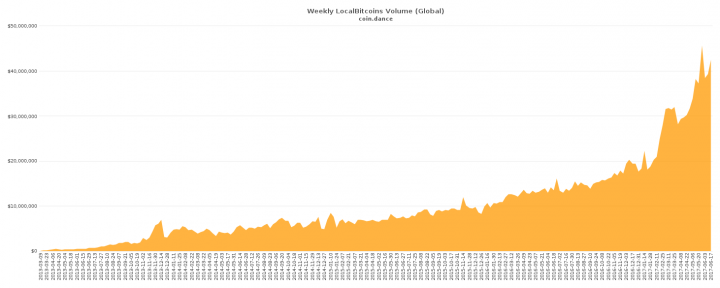
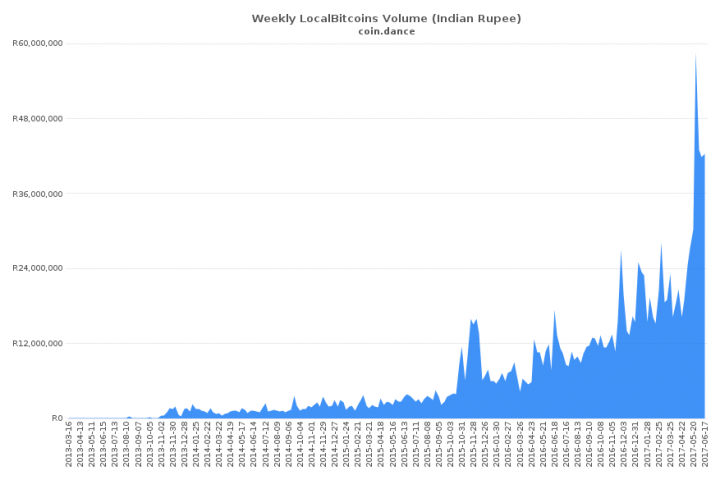
US Dollar denominated trading volume continues to dominate the markets. Most of the non-US Dollar trading includes a premium, with South Korea $200+ over USD spot.
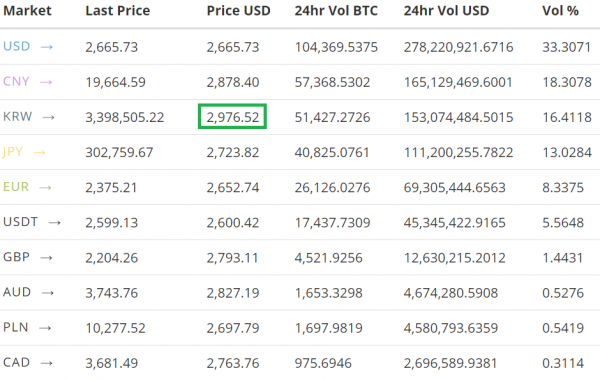
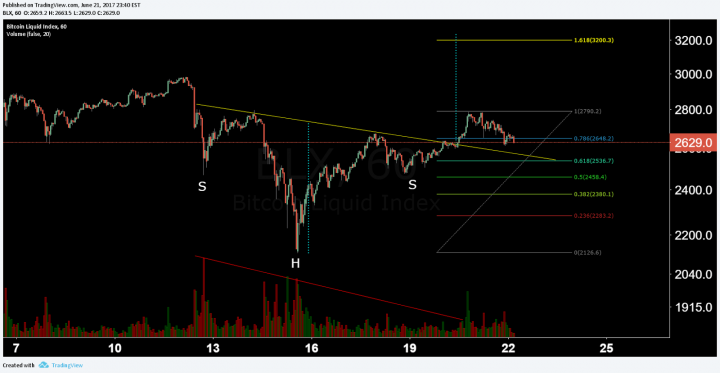
There is always a concern for health of trend after a -20% down day near all time highs. However, the weekly candle closed with a strong reversal wick, suggesting a failure to break down further. Just as the long wick on the candle close two weeks ago had a small chance of breaking higher statistically, this candle structure suggests continuation over reversal.
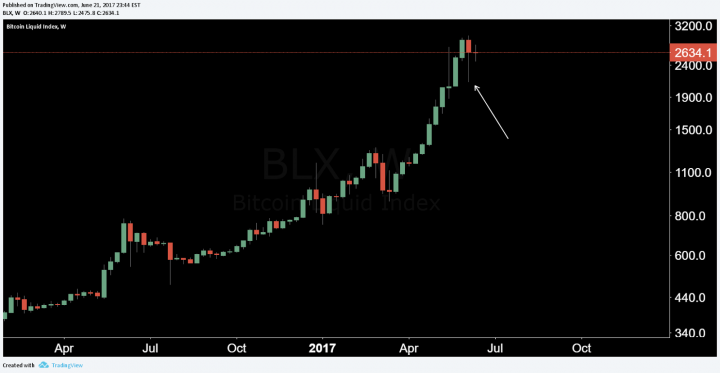
Traders can also use Ichimoku Cloud to asses health of trend. The Ichimoku Cloud is a constant, auto-drawn indicator which quickly offers an immense amount of valuable information on any time frame. The Cloud is best used at higher time frames as more data generally provides more accurate signals and less false positives. The indicator uses moving averages and dynamic support and resistance to make projections of key zones, as well as capturing 80% of any given trend. As long as the price remains above the Cloud, sentiment remains bullish. Price in the Cloud indicates a neutral trend, and below the Cloud indicates a bearish trend. When the Tenkan (T) is over the Kijun (K) sentiment is bullish. K over T would indicate bearish sentiment. When the Lagging Span (LS) is above the Cloud and above the price sentiment is bullish, below the Cloud and price would indicate bearish sentiment. The best entry signals for the Cloud occur when the trend is obvious, but 1 or 2 of the signals have yet to become confluent with a higher time frame trend. All signals on this timeframe are bullish, and should therefore not be used as a measure of current entry signals. On the daily timeframe, before the drop, cloud was printing support at the Tenkan and Kijun. Both levels were reached. For this reason, traders will typically consider high timeframe bids or asks at these levels as a safe re-entry zone. A touch of the Kijun is traditionally followed by trend continuation, and is known as the Kijun Bounce (white arrow). There are no other actionable entry signals at this time on the daily timeframe.
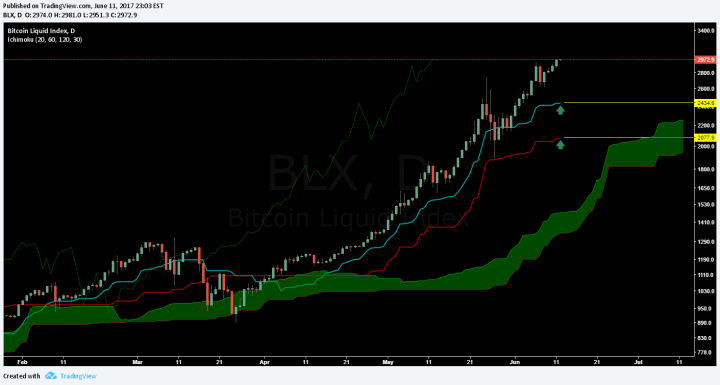
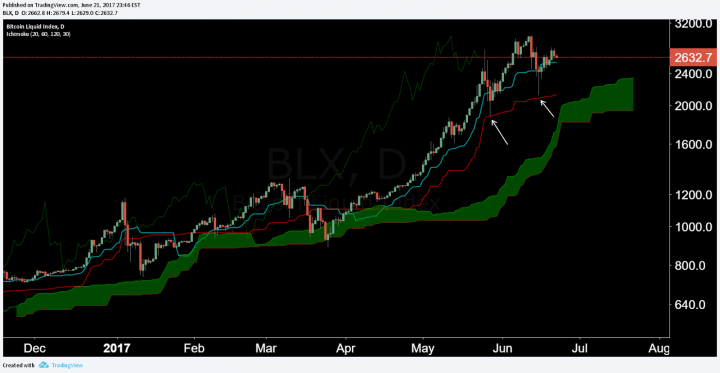
On the four hour timeframe, price has dipped below the cloud and reset. Price had a kumo breakout when breaking the inverted head and shoulders neckline, and will likely retest the Kijun and kumo support. These supports also match the neckline support test. Long trades will likely be entered at $2550 with stops around $2475, of the bottom of the right shoulder. A TK cross and recross above cloud would be another long entry signal.
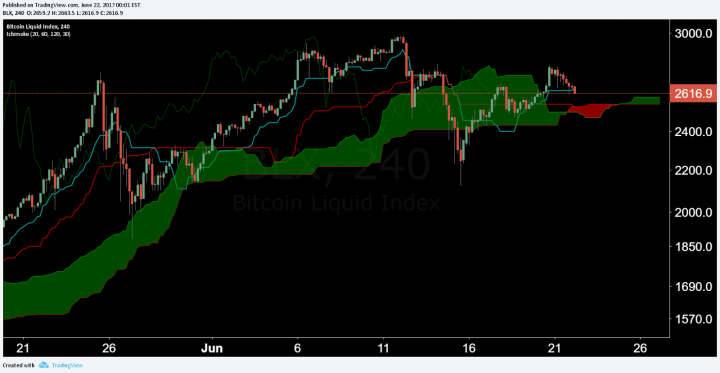
On the one hour timeframe, there are fractal and 50/200EMA crosses that we last saw in May. Should the bearish 50/200EMA cross not recur expect price to break for new local and all time highs.
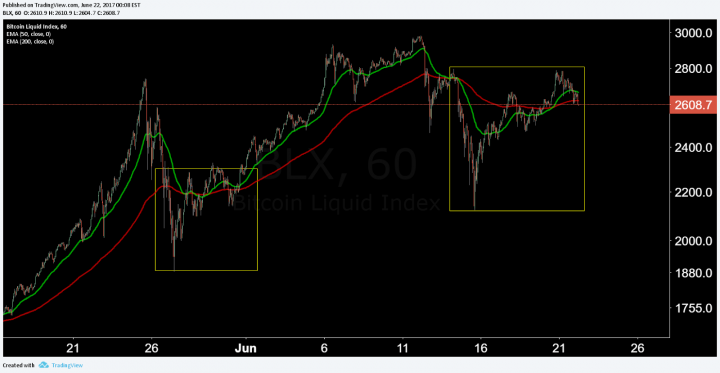
Lastly, a Pitchfork can be applied to the recent high and low. The median line (red) of the Pitchfork gives the expected mean of the trend. Price will continually attempt to return to this diagonal. Each diagonal of the Pitchfork can be thought of as a potential reversal zone or support/resistance line. The upper yellow diagonal zone being ‘most overbought,’ or the top bounds of the trend, and lower yellow diagonal zone being ‘most oversold,’ or the bottom bounds of the trend. The multiple price touches of the diagonals thus far suggests the Pitchfork has high validity, therefore, traders can project the trajectory of future price with a reasonable degree of certainty.
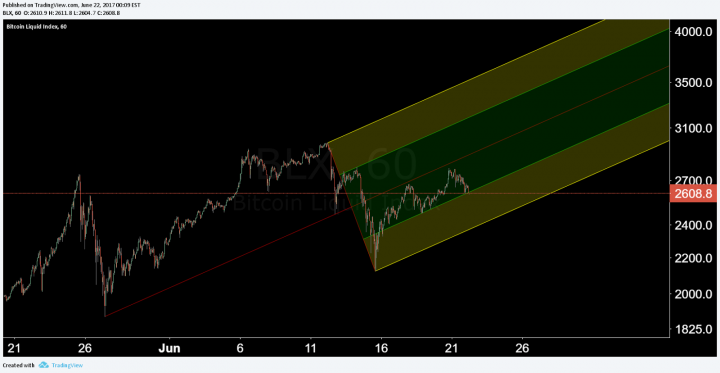
As long as price remains in the Pitchfork, the lower yellow boundary is considered a buy. The median line should be a high probability target from that zone. To further visualize how this might play out, look to the Pitchfork established from the March high and low. Should price fall out of the current Pitchfork, expect price to find support on the previous Pitchfork.
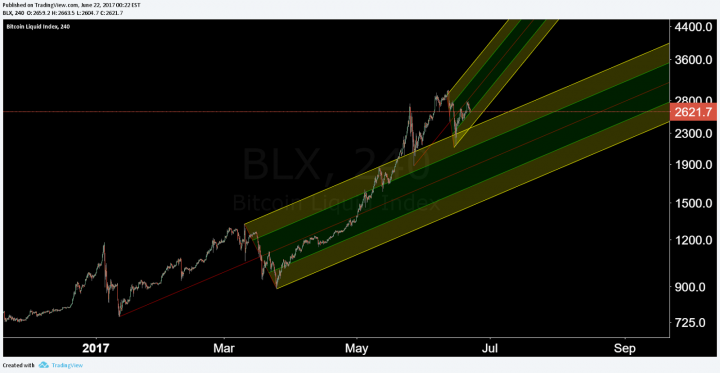

Currently, 85% of mining pools support “SegWit2x” which is taken from the New York Agreement, which states that SegWit will be adopted followed by a 2MB hard fork. This has largely been seen as a compromise between bitcoin core developers, nodes, Blockstream, miners, and others who wanted a hard fork block size increase. The implementation of SegWit is expected to be a large bullish event for price, as it will be seen as a piece of the solution towards network scalability. More on which developers and companies support which proposal can be found here.


Despite the SegWit2x proposal, support for UASF/BIP148 continues to rise among nodes. This is in large part because the hard fork will not be coded by the core developers, is not complete at the present time, and has not been tested.

Network difficulty is now up 84.25% for the year. Difficulty increases as a function of hash rate, which also continues to break all time highs, and now sits at just over 5 trillion GH/s.

Global Over The Counter (OTC) volume on LocalBitcoins continues unabated. India recently announced legalization and further regulation of Bitcoin, which should continue to bring legitimacy for traders and businesses. As a measure of interest, OTC volume in India has also shown parabolic growth.


US Dollar denominated trading volume continues to dominate the markets. Most of the non-US Dollar trading includes a premium, with South Korea $200+ over USD spot.

Technical Anaylsis
There is currently an inverted head and shoulders pattern on the 1h timeframe. The pattern has completed with matching descending volume profile. Fibonacci extensions and the measured move suggest a $3200 target upon completion. There are often throwbacks to the resistance turned support neckline (yellow diagonal), which is likely happening now. Should price break down further the pattern would be invalidated.
There is always a concern for health of trend after a -20% down day near all time highs. However, the weekly candle closed with a strong reversal wick, suggesting a failure to break down further. Just as the long wick on the candle close two weeks ago had a small chance of breaking higher statistically, this candle structure suggests continuation over reversal.

Traders can also use Ichimoku Cloud to asses health of trend. The Ichimoku Cloud is a constant, auto-drawn indicator which quickly offers an immense amount of valuable information on any time frame. The Cloud is best used at higher time frames as more data generally provides more accurate signals and less false positives. The indicator uses moving averages and dynamic support and resistance to make projections of key zones, as well as capturing 80% of any given trend. As long as the price remains above the Cloud, sentiment remains bullish. Price in the Cloud indicates a neutral trend, and below the Cloud indicates a bearish trend. When the Tenkan (T) is over the Kijun (K) sentiment is bullish. K over T would indicate bearish sentiment. When the Lagging Span (LS) is above the Cloud and above the price sentiment is bullish, below the Cloud and price would indicate bearish sentiment. The best entry signals for the Cloud occur when the trend is obvious, but 1 or 2 of the signals have yet to become confluent with a higher time frame trend. All signals on this timeframe are bullish, and should therefore not be used as a measure of current entry signals. On the daily timeframe, before the drop, cloud was printing support at the Tenkan and Kijun. Both levels were reached. For this reason, traders will typically consider high timeframe bids or asks at these levels as a safe re-entry zone. A touch of the Kijun is traditionally followed by trend continuation, and is known as the Kijun Bounce (white arrow). There are no other actionable entry signals at this time on the daily timeframe.


On the four hour timeframe, price has dipped below the cloud and reset. Price had a kumo breakout when breaking the inverted head and shoulders neckline, and will likely retest the Kijun and kumo support. These supports also match the neckline support test. Long trades will likely be entered at $2550 with stops around $2475, of the bottom of the right shoulder. A TK cross and recross above cloud would be another long entry signal.

On the one hour timeframe, there are fractal and 50/200EMA crosses that we last saw in May. Should the bearish 50/200EMA cross not recur expect price to break for new local and all time highs.

Lastly, a Pitchfork can be applied to the recent high and low. The median line (red) of the Pitchfork gives the expected mean of the trend. Price will continually attempt to return to this diagonal. Each diagonal of the Pitchfork can be thought of as a potential reversal zone or support/resistance line. The upper yellow diagonal zone being ‘most overbought,’ or the top bounds of the trend, and lower yellow diagonal zone being ‘most oversold,’ or the bottom bounds of the trend. The multiple price touches of the diagonals thus far suggests the Pitchfork has high validity, therefore, traders can project the trajectory of future price with a reasonable degree of certainty.

As long as price remains in the Pitchfork, the lower yellow boundary is considered a buy. The median line should be a high probability target from that zone. To further visualize how this might play out, look to the Pitchfork established from the March high and low. Should price fall out of the current Pitchfork, expect price to find support on the previous Pitchfork.

Segwit, rootstock .There will be good implemantations coming. A chainsplit is most likely the most challenging thought.
Hi! I am a robot. I just upvoted you! I found similar content that readers might be interested in:
https://bravenewcoin.com/news/bitcoin-price-analysis-bitcoin-erases-losses/
Looking good, the price will continue to go up after the things cleared up.